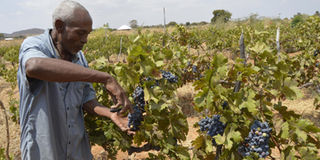Fresh hope for farmers

What you need to know:
- The launch of trading on the CE platform will enable Tanzanians to get the requisite agriculture market interventions that were set by both the second phase of the Agriculture Sector Development Plan (ASDP-II) and the National Five-Year Development Plan (NFYDP 2016/17-2020/21).
Dar es Salaam. Trading at the long-awaited commodities exchange (CE) is scheduled to take off next month.
The launch of trading on the CE platform will enable Tanzanians to get the requisite agriculture market interventions that were set by both the second phase of the Agriculture Sector Development Plan (ASDP-II) and the National Five-Year Development Plan (NFYDP 2016/17-2020/21).
Speaking to The Citizen in Dar es Salaam recently, the chief executive officer of the Tanzania Mercantile Exchange Plc (TMX), Mr Godfrey Malekano, said the appointment has been done of six commercial banks as clearing and settlement banks with whom members will open special accounts for settling commodity contracts traded on the exchange.
“From next week (beginning today), the exchange will run a mock trading exercise to familiarise and otherwise prepare members for the official launch,” he said.
In February, this year, Prime Minister Kassim Majaliwa visited the exchange-in-formation and urged all those concerned to speed up efforts of making it operational.
Along with that, a team of experts from different players toured major cotton-growing areas in the country to assess the feasibility of implementing the warehouse receipt system in the cotton sub-sector.
The experts were drawn from TMX itself, as well as from the Capital Markers and Securities Authority (CMSA), the TIB Development Bank, the Tanzania Agricultural Development Bank (TADB) and the Tanzania Cooperative Development Commission (TCDC).
In the event, the team identified Chato and Kahama in Geita and Shinyanga regions, respectively, for warehouse receipt and commodity exchange pilot implementation in the 2018 season.
In that regard, talks have been initiated with the banks which will finance cooperative unions in their endeavours of aggregating seed cotton from farmers for ginning and subsequent trading on the envisaged commodity exchange.
Mr Malekano said experts have analysed the cotton value chain, the warehouse receipt system and other requisite facilities, including related infrastructure.
They also identified some challenges – especially as they relate to the status of cooperatives-owned warehouses, ginneries and other facilities – which need to be addressed before implementation of the warehouse receipt system is applied across the board.
TMX is a multi-commodity exchange that would create orderly, transparent and ready market for agricultural commodities and precious metals that are produced by farmers, as well as improved agricultural production that would help create more opportunities for investment in the Tanzanian economy.
The exchange is also out to support the industrialisation initiatives set in motion by the Fifth Phase government of President John Magufuli by guaranteeing quantities and quality standards of the raw materials required by processors.
The banks involved in the programme are CRDB, NMB, TIB Corporate, Azania, Standard Chartered and Exim Bank.
There also are four companies which will serve as trading and market intermediaries.
Mr Malekano further told The Citizen that TMX is currently working in collaboration with the Warehouse Receipt Regulatory Board (WRRB) in finalising the preparations that would result in implementing the warehouse receipt system in the sesame seeds and cotton sub-sectors.
All this is, of course, part of the processes in implementing the launch of operations of the envisaged commodities exchange.
TMX is a virtual marketplace where buyers and sellers come together to trade contracts-linked commodities – always being assured of excellent quality, delivery and payment services.




